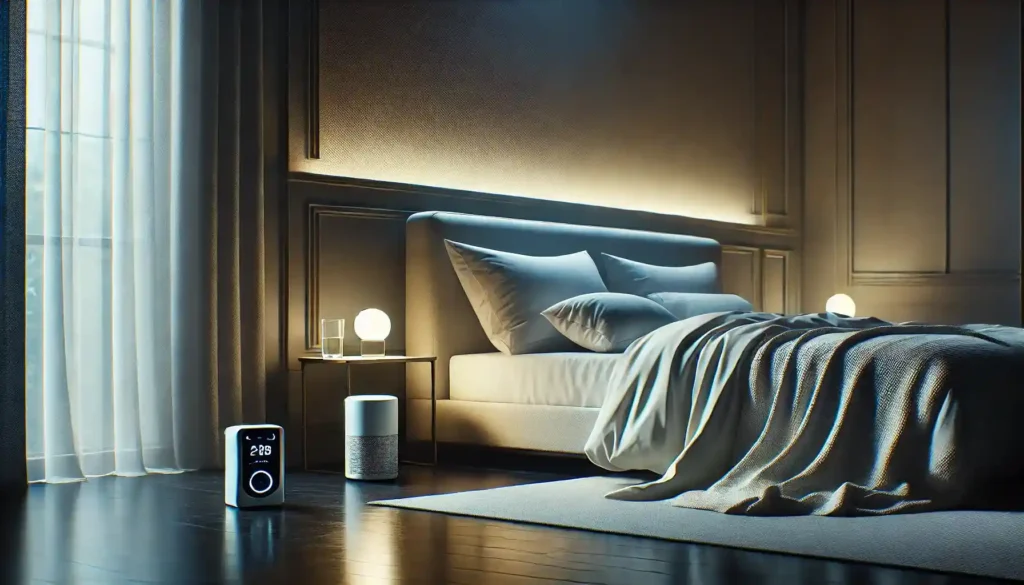Good sleep hygiene is essential for maintaining overall health and well-being. It involves creating a conducive environment and adopting habits that promote consistent, uninterrupted sleep. By practicing effective sleep hygiene, individuals can improve their sleep quality, boost their mood, and enhance their overall productivity. Sleep hygiene encompasses various practices and habits that contribute to better rest.
“Good sleep is the cornerstone of health. By prioritizing sleep hygiene, we set ourselves up for better mental and physical well-being.” – Dr. Matthew Walker, neuroscientist and author of “Why We Sleep”
Dr. Matthew Walker emphasizes the critical role of sleep in maintaining health and well-being.
Understanding Sleep Hygiene
Sleep hygiene refers to the practices and habits that are necessary to have a good night’s sleep and full daytime alertness. Sleep hygiene includes a variety of lifestyle and environmental factors that contribute to restful and restorative sleep.
Key Elements of Sleep Hygiene
- Regular Sleep Schedule: Going to bed and waking up at the same time every day.
- Comfortable Sleep Environment: Ensuring a quiet, dark, and cool sleeping space.
- Healthy Habits: Avoiding stimulants and heavy meals before bedtime.
- Relaxation Techniques: Engaging in activities that promote relaxation before sleep.
“Consistent sleep patterns and a conducive sleep environment are fundamental to good sleep hygiene.” – Dr. Michael Breus, clinical psychologist and sleep specialist.
Dr. Michael Breus highlights the importance of consistency and environment in sleep hygiene.

Benefits of Good Sleep Hygiene
Practicing good sleep hygiene offers numerous benefits that extend beyond just a good night’s sleep. It can improve physical health, mental well-being, and overall quality of life.
Physical Health
Adequate sleep is essential for various bodily functions and overall physical health.
- Immune Function: Quality sleep supports the immune system, helping the body fight off illnesses.
- Heart Health: Good sleep hygiene reduces the risk of cardiovascular diseases.
- Weight Management: Adequate sleep helps regulate hormones that control appetite and metabolism.
Mental Well-Being
Good sleep hygiene positively impacts mental health and cognitive function.
- Mood Regulation: Consistent sleep patterns help stabilize mood and reduce the risk of depression.
- Cognitive Performance: Quality sleep enhances memory, learning, and problem-solving skills.
- Stress Reduction: Adequate rest helps lower stress levels and improve emotional resilience.
Enhanced Productivity
Better sleep leads to increased productivity and improved performance in daily activities.
- Concentration: Good sleep improves focus and attention throughout the day.
- Energy Levels: Restorative sleep boosts energy and reduces daytime fatigue.
- Work Efficiency: Adequate sleep contributes to better decision-making and work performance.
“Prioritizing sleep hygiene can lead to significant improvements in overall health and daily functioning.” – Dr. Sara Mednick, sleep researcher and author.
Dr. Sara Mednick emphasizes the wide-ranging benefits of good sleep hygiene.

Techniques for Better Sleep Hygiene
Improving it involves adopting specific practices that promote better sleep. Here are some effective techniques to enhance sleep hygiene and achieve restful sleep.
Maintain a Consistent Sleep Schedule
Keeping a regular sleep schedule helps regulate your body’s internal clock.
- Set a Bedtime: Go to bed and wake up at the same time every day, even on weekends.
- Avoid Napping: Limit naps to 20-30 minutes to avoid disrupting your sleep schedule.
- Gradual Adjustments: Make gradual changes to your sleep schedule to avoid sudden disruptions.
Create a Relaxing Bedtime Routine
Establishing a calming pre-sleep routine can signal your body that it’s time to wind down.
- Reading: Engage in light reading to relax your mind.
- Bath: Take a warm bath to help your body relax and prepare for sleep.
- Meditation: Practice mindfulness or meditation to reduce stress and promote relaxation.
Optimize Your Sleep Environment
A comfortable and conducive sleep environment is crucial for quality rest.
- Comfortable Mattress: Invest in a supportive mattress and pillows.
- Dark Room: Use blackout curtains or an eye mask to block out light.
- Cool Temperature: Keep your bedroom cool to create an optimal sleep environment.
“Creating a sleep-friendly environment is a key component of good sleep hygiene.” – Dr. Chris Winter, neurologist and sleep medicine specialist.
Dr. Chris Winter highlights the importance of a conducive sleep environment.
Avoid Stimulants and Heavy Meals
What you consume before bedtime can significantly impact your sleep quality.
- Limit Caffeine: Avoid caffeine and other stimulants in the late afternoon and evening.
- Avoid Alcohol: While alcohol may help you fall asleep, it can disrupt your sleep later in the night.
- Light Meals: Eat a light dinner and avoid heavy or spicy foods before bedtime.
Manage Stress and Anxiety
Stress and anxiety can interfere with your ability to fall asleep and stay asleep.
- Relaxation Techniques: Practice relaxation techniques such as deep breathing or progressive muscle relaxation.
- Journaling: Write down your thoughts and worries before bed to clear your mind.
- Therapy: Consider talking to a therapist if stress or anxiety is affecting your sleep.
“Managing stress through relaxation techniques can improve both sleep quality and overall health.” – Dr. Andrew Weil, integrative medicine expert.
Dr. Andrew Weil emphasizes the role of stress management in promoting better sleep.

The Role of Technology in Sleep Hygiene
While technology can be a source of sleep disruption, it can also be used to improve sleep hygiene when managed properly. It can benefit from mindful use of technology.
Limiting Screen Time
Exposure to screens before bed can interfere with your sleep due to blue light emissions.
- Screen-Free Time: Avoid screens at least one hour before bedtime.
- Blue Light Filters: Use blue light filters on your devices if you must use them at night.
- Reading: Opt for reading physical books or using e-readers with adjustable lighting.
Using Sleep Aids and Apps
Certain technologies can aid in improving sleep quality and maintaining good sleep hygiene.
- White Noise Machines: Use white noise machines or apps to block out disruptive sounds.
- Sleep Tracking Apps: Track your sleep patterns to identify areas for improvement.
- Relaxation Apps: Use apps that offer guided meditations or calming sounds to help you relax before bed.
“Mindful use of technology can support better sleep hygiene and overall well-being.” – Arianna Huffington, author and sleep advocate.
Arianna Huffington discusses how technology can be both a disruptor and a tool for better sleep.
Understanding Sleep Hygiene offers insights into creating habits for better sleep. For more tips on improving sleep quality, visit Improving Sleep Quality. Discover additional strategies for relaxation in our relaxation techniques section. Learn more about stress management with our guide to reducing stress. For more information on sleep hygiene, visit the National Sleep Foundation. To explore sleep science, check out the American Academy of Sleep Medicine. For additional resources, see Sleep.org.














